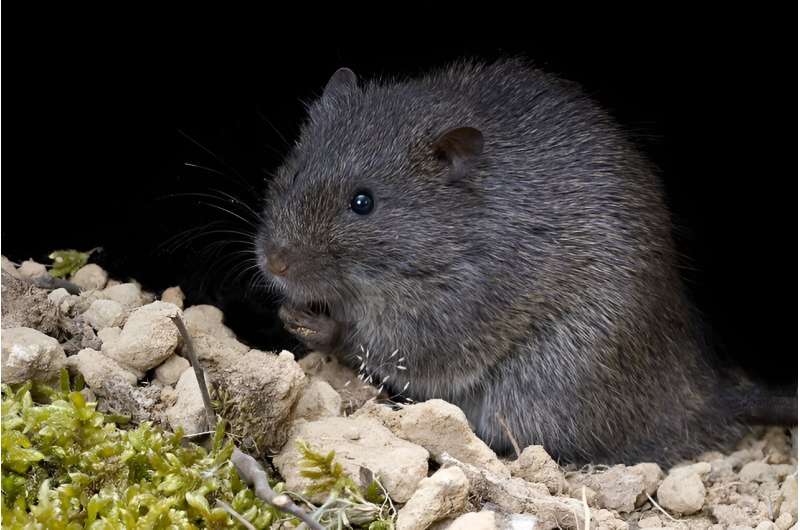The unfortunately named Australian swamp rat. Credit: David Paul/Wikimedia Commons, CC BY
The common names of Australian animals often originate in Aboriginal languages, and beneficially so. Continuing use of names such as kangaroo and kookaburra helps to honor the wealth of knowledge possessed by First Nations peoples, to appreciate the natural heritage of a place more deeply, and to naturalize English to this continent.
Some 30 years ago, I and colleagues published a paper calling for this naming practice to extend to native rodents. This group of animals contains many handsome and fascinating animals among its many species.
But sadly, native rats and mice don't usually evoke sympathy among the Australian public. The unappealing common names for the species—such as swamp rat or long-haired rat—do little to help the problem.
Public sentiment towards an animal matters. It can affect whether their habitat is protected, if they are prioritized for research and conservation, and the amount of funding devoted to protecting them. So among the many other good reasons to ascribe Aboriginal common names to our species, it might mean the difference between their survival and extinction.
What's in a name?
Of the 60 Australian rodent species, nearly 20 are extinct or greatly diminished in range.
As with other threatened mammals, desert-dwelling rodents have suffered most. For example among hopping mice, five of ten species are extinct. Those still remaining could do with our attention—and naming them may help.
Research has shown common names of species are an important tool when seeking to increase community support for conservation.
One study by Australian researchers analyzed the common names of almost 27,000 animals from the IUCN Red List of threatened species. It found frequent words in animal common names that produced strong positive or negative sentiment.
Common words driving positive sentiment included "golden" and "great." Words driving negative sentiment included "rat," "lesser" and "blind."
The research found many words were also associated with human emotions. For example, "dove" was associated with joy, anticipation and trust. "Rat" was associated with fear and disgust, probably due to its associations with disease, uncleanliness and deceitfulness, the study found.
The researchers said strategic name changes may improve public engagement and support for species and therefore provide effective, low-cost conservation benefits.
How about 'pakooma' and 'palyoora'?
So where might we find new, more appealing monikers for our maligned rodents? Our 1995 paper suggested selecting common names from relevant Aboriginal words that might readily be pronounced by English speakers.
At the time, we checked our document before publication with offices of the then-current Aboriginal and Torres Strait Islander Commission. Should Aboriginal words be used to rename species today, agreement should be sought from the relevant language group.
The brush-tailed rabbit-rat, Conilurus penicillatus, is an example of a rodent ripe for renaming. It's a striking and vigorous animal of northern Australia, which became extinct in Kakadu National Park in the 2000s and now persists in only a handful of isolated regions. How unfair it is that this splendid creature should be thought of as a mere rat—as well as bearing the nomenclatural burden of Australia's worst vertebrate pest? Perhaps it could be renamed pakooma, from the East Arnhem languages.
Another sad example is provided by Xeromys myoides, an inhabitant of coastal swamps and mangroves. It is known as the false water rat, a name which could barely be improved upon if the aim is to demean. The animal could well be called yirrkoo, from the Kunwinjku/Mayali language.
And consider the graceful Pseudomys australis, an animal of the outback Channel Country in Queensland and South Australia. The species is of conservation concern, but public attention is hardly likely when the animal is called a plains rat. It deserves better—perhaps the lovely name palyoora, from the Wangkangurru language.
Provided by The Conversation
This article is republished from The Conversation under a Creative Commons license. Read the original article.![]()























